

Exploring insights from the complexity sciences. Understanding the complex responsive processes of human organizing. Complexity & Management Centre. Welcome to Complexity Research. Complexity Programme at the LSE. Complexity Science. Complexity Labs. Centre for Complexity Science at the University of Warwick. Student Conference on Complexity Science - Granada, Spain 2015 #SCCS2015. Complexicat. Complexicat. Centre for Complexity Science at the University of Warwick. Blog - Complexity Science. Networks, Geometry and Clustering Clustering is a vital tool when handling data making it a central part of data science.
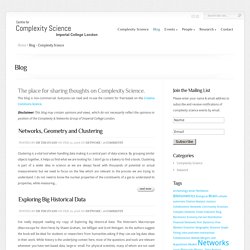
By grouping similar objects together, it helps us find what we are looking for. I don’t go to a bakery to find a book. Clustering is part of a wider idea in science as we are always faced with thousands of potential or actual measurements but we need to focus on the few which are relevant to the process we are trying to understand. I do not need to know the nuclear properties of the constituents of a gas to understand its properties, while measuring... read more Exploring Big Historical Data I’ve really enjoyed reading my copy of Exploring Big Historical Data: The Historian’s Macroscope (Macroscope for short here) by Shawn Graham, Ian Milligan and Scott Weingart.
Modelling the Footprints of Innovation: Citation Networks When one document refers to another in it’s text, this is called a citation. Elucidating a Complex Rhythm with a Simple Model Time Constrained Networks. Some new surprises in chaos. Complexity Explorer. Complexity Explorer. Latest Posts. The other day, I was scanning the shelves at the half-price bookstore, and came across a book entitled Imagine What the World Could be in the 21st Century: Visions of a Better Future from Leading American Thinkers, edited by Marianne Williamson.
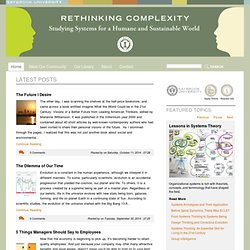
It was published in the millennium year 2000 and contained about 40 short articles by well-known contemporary authors who had been invited to share their personal visions of the future. As I skimmed through the pages, I realized that this was not just another book about social and environmental... Evolution is a constant in the human experience, although we interpret it in different manners. To some, particularly scientists, evolution is an accidental progression that yielded the cosmos, our planet and life. To others, it is a process created by a supreme being as part of a master plan. Now that the economy is beginning to pick up, it’s becoming harder to retain quality employees. ComplexityBlog.com - Science, Engineering, and Philosophy of Complexity & Adaptive Systems. Complexity and Social Networks Blog. 13 April 2014 Events/Announcements Workshop on Github on April 15 at noon (CCNR @ Northeastern) Please join us for this workshop on Github.
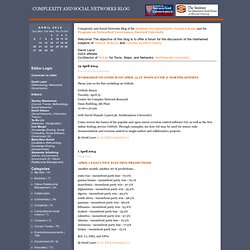
GitHub Basics Tuesday, April 15 Center for Complex Network Research Dana Building, 5th Floor 12:00-1:30 pm with Navid Dianati (LazerLab, Northeastern University) Sociology and Complexity Science blog. Sociology complexity science complexity case based modeling case based method castellani social complexity visual complexity agent based modeling kent state university ashtabula. Sociology and Complexity Science blog. Waterloo Institute for Complexity and Innovation (WICI) Introduction to Dynamical Systems and Chaos from Complexity Explorer. Aleta Duvall completed this course.

I appreciated the structured approach to the course material and the painstaking development of foundational concepts. Dr. Feldman presents the course in an informal, across-the-desk manner. Each lecture feels like you are experiencing an individual tutoring session during office hours. I recommend the course to students who struggle with math or computing anxiety; only mininal calculus is needed to understand and apply the material. Lectures: What is a dynamical system? General properties - classification / characterization.
SCCS 2014 - Keynotes. Professor Nigel Gilbert,University of Surrey, UK Professor Nigel Gilbert is one of the pioneers of applying agent-based modelling to the social sciences, which provided the foundations of modern computational sociology.
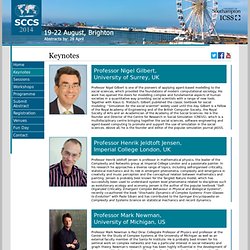
His work has opened the doors for modelling complex and fundamental aspects of human societies in a quantitative way providing social scientists with a range of new tools. Together with Klaus G. Troitzsch, Gilbert published the classic textbook for social modeling: "Simulation for the social scientist" widely used until this day. Gilbert is a Fellow of the Royal Academy of Engineering and of the British Computer Society, the Royal Society of Arts and an Academician of the Academy of the Social Sciences.
Professor Henrik Jeldtoft Jensen,Imperial College London, UK. Yaneer Bar-Yam. Www.necsi.edu New England Complex Systems Institute 238 Main Street Suite 319, Cambridge, MA 02142 Phone: 617-547-4100 Fax: 617-661-7711 Professor Yaneer Bar-Yam is Founding President of the New England Complex Systems Institute.
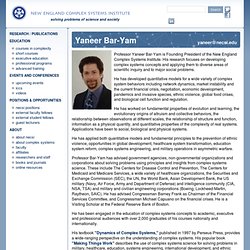
His research focuses on developing complex systems concepts and applying them to diverse areas of scientific inquiry and to major social problems. He has developed quantitative models for a wide variety of complex system behaviors including network dynamics, market instability and the current financial crisis, negotiation, economic development, pandemics and invasive species, ethnic violence, global food crises, and biological cell function and regulation. He has applied both quantitative models and fundamental principles to the prevention of ethnic violence, opportunities in global development, healthcare system transformation, education system reform, complex systems engineering, and military operations in asymmetric warfare. Overview Economics Ethnic Violence.
Exploring The Adjacent Possible. About E:CO. New England Complex Systems Institute. Exploring insights from the complexity sciences.